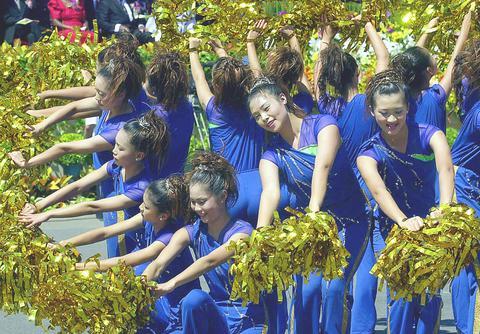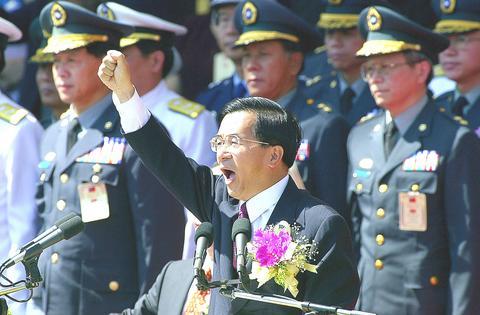In his fourth Double Ten National Day speech since he came to power, President Chen Shui-bian (
"The `door to cooperation' and the `door to peace' will always exist between the two sides of the Taiwan Strait," Chen said in his address to the public and foreign guests in front of the Presidential Office yesterday morning.
"The `door to cooperation' can open only if the `one China' and `one country, two systems' formulas are put aside," he said. "And the `door to peace' can open only when China renounces its threat to resort to the use of force and halts its strategic attempts to isolate Taiwan internationally."

PHOTO: CHIANG YING-YING, TAIPEI TIMES
Chen reaffirmed that he must safeguard Taiwan's sovereignty, security and dignity and ensure its sustainable development.
"Only those who do not believe in themselves and do not believe in Taiwan will succumb to hegemony, make concessions for peace, or try to convince us that China's military intimidation and coercion compels us to accept the so-called `one China' principle," he said.
Chen also expressed appreciation to the heads of state, ambassadors and delegations representing Taiwan's allies who were attending the 92nd anniversary of the founding of the Republic of China (ROC). Taiwan was a Japanese colony when the ROC was founded in 1911.

PHOTO: SEAN CHAO, TAIPEI TIMES
"All these years, Taiwan has been able to take an active role in the international arena, not merely because of our strong economic and trade capabilities, but, more importantly, as recognition of our relentless pursuit to put into practice our foundation of democracy and freedom," Chen said.
"Some argue that there will be more room for Taiwan on the international stage if we accept the `one China' principle. However, if we compromise our stance on sovereignty and relinquish our existing democracy and freedom, we will waive our right to join international organizations, and it will be impossible for us to ever have a voice in the global community," he said.
On the economy, Chen said: "The signs of economic recovery are increasingly evident, and momentum is building, while the most difficult times are now behind us. The indicators and ratings of international institutions provide an optimistic forecast for Taiwan's future economic performance."
"We ourselves should have faith in Taiwan," he said, "and there is no reason to heed the pessimistic rhetoric of a few."
Stressing his resolution to facilitate the development of cross-strait trade as well as his confidence in winning next year's presidential election, Chen said that though China gave no positive response to his recent proposal -- "one objective and three stages" for direct cross-strait transportation -- the government will continue to do its part.
"I have no doubt that after the presidential election next year, the development of cross-strait trade will enter a new phase," he said.
Chen ended his speech by calling on the public to have faith in democracy, in reform and in Taiwan.
During government celebrations at the Presidential Office later yesterday, Chen was to say that the government must accomplish constitutional reform by uniting all 23 million people of the country to realize the birth of a new constitution.
"If constitutional reform is to succeed, it is necessary to harness popular will, political consensus among parties and the involvement of constitutional scholars. We will not make the past mistake of having a single party push through unilateral constitutional change," the president will say. "The final draft of this constitution should be passed through a referendum involving all Taiwan's citizens."
Also See Stories:
KMT-PFP stage festivities in Chiayi
Overseas Chinese acclaim Taiwan's accomplishments

The combined effect of the monsoon, the outer rim of Typhoon Fengshen and a low-pressure system is expected to bring significant rainfall this week to various parts of the nation, the Central Weather Administration (CWA) said. The heaviest rain is expected to occur today and tomorrow, with torrential rain expected in Keelung’s north coast, Yilan and the mountainous regions of Taipei and New Taipei City, the CWA said. Rivers could rise rapidly, and residents should stay away from riverbanks and avoid going to the mountains or engaging in water activities, it said. Scattered showers are expected today in central and

COOPERATION: Taiwan is aligning closely with US strategic objectives on various matters, including China’s rare earths restrictions, the Ministry of Foreign Affairs said Taiwan could deal with China’s tightened export controls on rare earth metals by turning to “urban mining,” a researcher said yesterday. Rare earth metals, which are used in semiconductors and other electronic components, could be recovered from industrial or electronic waste to reduce reliance on imports, National Cheng Kung University Department of Resources Engineering professor Lee Cheng-han (李政翰) said. Despite their name, rare earth elements are not actually rare — their abundance in the Earth’s crust is relatively high, but they are dispersed, making extraction and refining energy-intensive and environmentally damaging, he said, adding that many countries have opted to

People can preregister to receive their NT$10,000 (US$325) cash distributed from the central government on Nov. 5 after President William Lai (賴清德) yesterday signed the Special Budget for Strengthening Economic, Social and National Security Resilience, the Executive Yuan told a news conference last night. The special budget, passed by the Legislative Yuan on Friday last week with a cash handout budget of NT$236 billion, was officially submitted to the Executive Yuan and the Presidential Office yesterday afternoon. People can register through the official Web site at https://10000.gov.tw to have the funds deposited into their bank accounts, withdraw the funds at automated teller

CONCESSION: A Shin Kong official said that the firm was ‘willing to contribute’ to the nation, as the move would enable Nvidia Crop to build its headquarters in Taiwan Shin Kong Life Insurance Co (新光人壽) yesterday said it would relinquish land-use rights, or known as surface rights, for two plots in Taipei’s Beitou District (北投), paving the way for Nvidia Corp to expand its office footprint in Taiwan. The insurer said it made the decision “in the interest of the nation’s greater good” and would not seek compensation from taxpayers for potential future losses, calling the move a gesture to resolve a months-long impasse among the insurer, the Taipei City Government and the US chip giant. “The decision was made on the condition that the Taipei City Government reimburses the related